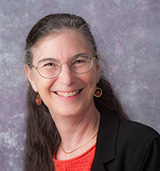Deborah Galson, PhD
Dr. Deborah Galson is an Associate Professor of Medicine, Division of Hematology/Oncology and of Microbiology & Molecular Genetics, University of Pittsburgh School of Medicine. She is a member of the UPMC Hillman Cancer Center Genome Stability Program. Dr. Galson founded and now serves as the co-Director of the Pittsburgh Center for Interdisciplinary Bone & Mineral Research.
Dr. Galson graduated with a BS in Biology/Genetics & Biochemistry from Cornell University in Ithaca, NY. She spent 1 year of her graduate training at the Weizmann Institute of Science in Rehovot, Israel, and the remaining years at Brandeis University in Waltham, MA, where she obtained her PhD in Biology in 1984 and was an American Association of University Women Fellow. From 1984-1990, Dr. Galson was a NIH postdoctoral fellow (NCI) and later postdoctoral associate at the Massachusetts Institute of Technology (MIT) in Cambridge, MA.
Following her postdoc, Dr. Galson was a Visiting Scientist at MIT and also an Instructor of Medicine and later Assistant Professor of Medicine at Harvard Medical School in Boston, MA. She was a founding member of the BIDMC Bone & Joint Institute. Dr. Galson joined the University of Pittsburgh School of Medicine faculty in 2002.
The main theme of Dr. Galson’s research has been to investigate the regulation of differentiation starting from identifying key transcriptional regulators, then expanding outwards to reveal the important signal transduction pathways and also inwards to alteration of chromatin structure. Her laboratory uses this theme to reveal novel pathways utilized in pathological bone diseases, such as Paget’s disease of bone and Multiple Myeloma bone disease, which may provide new therapeutic targets. Her current studies focus on the: 1.) Mechanisms used by measles virus nucleocapsid protein (MVNP), alone or in combination with mutant p62 (SQSTM1; eg. p62P392L), activates cellular genes and alters osteoclast differentiation to generate pagetic bone lesions; 2.) Mechanism by which multiple myeloma suppresses osteoblast differentiation by inducing Gfi1-mediated epigenetic repression of Runx2; 3.) Roles of Gfi1 and EZH2 in regulating osteoblast and osteoclast differentiation and responses to pathological signals; 4.) Roles of IKK family members TBK1, IKKε, and optineurin in inflammatory bone diseases, including multiple myeloma and Paget’s disease of bone; 5.) Factors affecting epigenetic chromatin structure regulation of gene expression in osteoclast and osteoblast lineage cells in pathological conditions; and 6.) Preclinical assessment of the efficacy of targeting pathways with novel roles identified in our studies of inflammatory bone diseases on preserving bone health in mouse myeloma models.
Dr. Galson is a member of several professional and scientific organizations, including, but not limited to: American Association for Cancer Research (AACR); American Society for Biochemistry and Molecular Biology (ASBMB); American Society for Bone and Mineral Research (ASBMR); American Society of Hematology (ASH); and Cancer and Bone Society (CABS).
She has served on multiple ASBMR committees, was named a Fellow of the American Society for Bone and Mineral Research in 2019, and was selected to be honored in the Best of the 2017 AACR Journals.
She has served as a grant reviewer for the National Institutes of Health (NIH), DOD Peer Reviewed Medical Research Program (PRMRP), NASA, the Canadian Institutes of Health Research (CIHR), Italian Ministry of Health, Dutch Research Council, Dutch Cancer Society, and Blood Cancer UK. She is also a reviewer for more than 32 journals, including: Arthritis & Rheumatology, Blood, Blood Advances, British Journal of Cancer, Cancer Research, Hematologica, Journal of Bone and Mineral Research, PNAS, Science Signaling, The Journal of Clinical Investigation.
View a list of Dr. Galson’s publications here.

